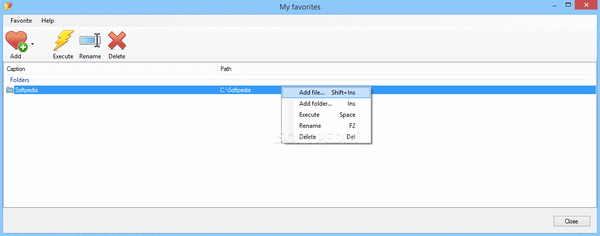By default, the Windows file explorer lets you access favorite, and important files and folders with only a few mouse clicks. On the other hand, you can grab third-party alternatives like ConFavor for even faster access, an intuitive design, and quick setup for individuals of all levels of experience.
Before you can benefit from what the application has to offer you need to make sure that .NET Framework is installed on your computer, because it’s a required component for functionality. Chances are it’s already on your computer, since modern Windows iterations come with it as a default feature.
Once launched, the configuration window shows up, but it’s also the place from which to open configured files and folders. Unfortunately, adding new items can’t be done by simply dropping them over the main window, so you need to use the dedicated browse dialogs for either files, or folders.
On the other hand, the application integrates itself in the context menu, making it even easier to add specific items to the list of favorite locations. In addition, the context menu can be used to also launch items, which means the application doesn’t have to be added to the system Startup folder to run with Windows.
Sadly, the application works only with offline locations, meaning there’s no support for web pages to be launched via your web browser. However, creating a specific shortcut, or link to a web page can lead to a workaround.
There’s no possibility to organize favorite items in custom groups. Moreover, folders you add don’t extend content, but rather bring up File Explorer to continue navigation from there. As such, adding too many items can lead to a pretty crowded context menu group.
Taking everything into consideration, we can say that ConFavor allows you to create a slick quick launch menu for your files and folders with cool integration directly in the context menu. Items can also be added this way, and even though the set of features is pretty shallow, it’s a fast way to create quick access points to important files and folders.

Gabriel
love this site
Reply
Marzia
thx for ConFavor keygen
Reply
Irene
thanks for the keygen for ConFavor
Reply
Antonio
Tack för ConFavor seriell
Reply